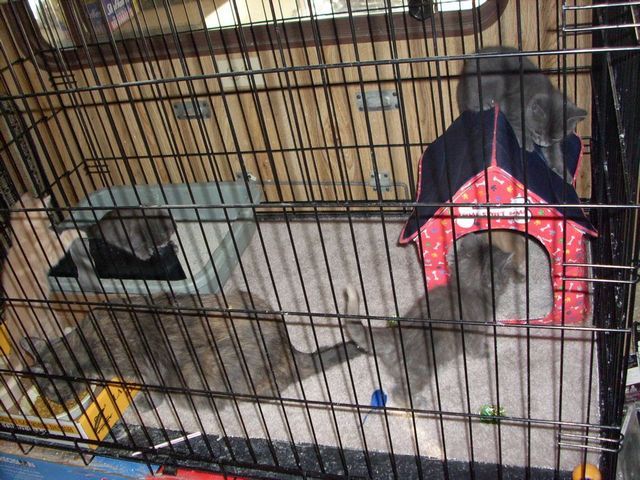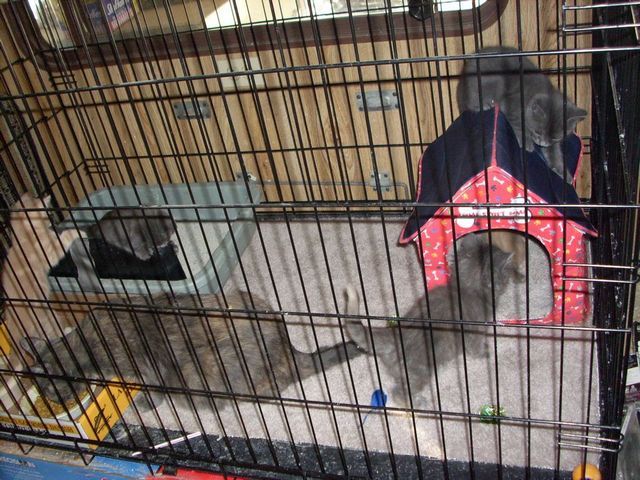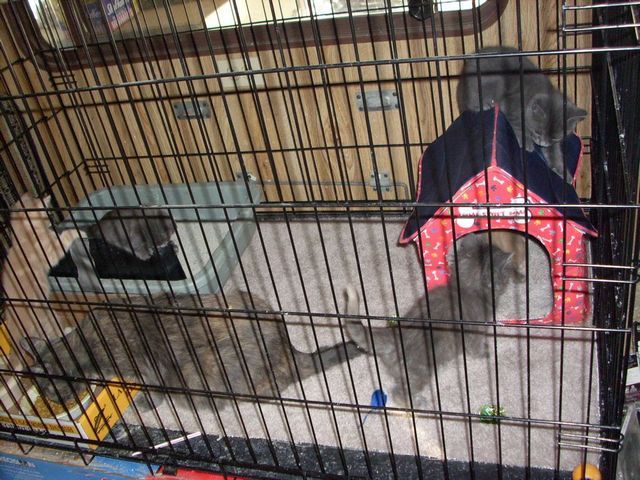QuestionHi Tabbi,
I just adopted a 5 month old kitten from the animal shelter under special circumstances. One of the professors at my university does work with the shelter and let me know about this kitten. The kitten was part of a litter that the shelter intended to put on their adoption floor, but one of the kittens ended up with a nasty upper respiratory infection and made the decision to euthanize the litter to prevent the spread of the illness among the cat population. The litter was euthanized, however, this kitten survived for some reason. Most likely she wasn't given an adequate does of the euthanasia drug or was simply missed. A decision was made to not place her on the adoption floor, but my professor was given the opportunity to find a home for her. When I went to see her and just after I brought her home, she was the sweetest little girl that was constantly purring and wanted to be held. Since then, she had become a very nasty, aggressive kitten. She's willing to play nicely on her own, but if you pick her up, she becomes extremely aggressive. She growls, hisses, spits, and flat out attacks the person picking her up. She'll let you touch her, but that's the extent of it. I've raised several kittens before and I've NEVER seen them act like this. I'm at a loss for what I should do. Sending her back to the shelter is not an option. If you could provide any advice, I would appreciate it. Thank you.
Stefanie
AnswerStefanie,
I'm glad sending her back is not an option! She lived for a reason, and it would be bad to reverse 'His' decision. Well.....I don't know for SURE, but I wouldn't want to do it! She's a special, lucky kitty, in both surviving and getting you for an owner. It sounds like it was meant to be!
Don't panic! Her behavior is typical of a feral. A lot of kittens at shelter are ferals and had at least one feral parent. Your previous experience probably was with domesticated kittens. Ferals are NOT like domesticated cats and will not behave like one. Ferals take special understanding and LOTS of patience. Plus right now, everything is new (including you) and she is scared and unsure which makes her feral trait of being distrustful of humans more pronounced. She probably also misses her littermates very much.
Ferals CAN become affectionate and loving, but it takes a LONG time for them to reach that point. And it takes a lot of time, patience, and love. And when they do reach that point when they are affectionate and loving (if they do), they normally still do not like to be held, restrained, and barely even petted. There is a human distrust that is inherited and inbred into them. They will never be like a typical domesticated housecat, but they can follow you around, rub against your legs, and lay next to you happily. Getting ferals as newborns or young kittens you have a better chance for a friendly kitty, but even then they still carry the feral behavior with them. Of course there are exceptions, but that is the standard behavior for ferals. They also usually only bond with one person. And will usually always remain skittish and frightened of strangers, noises, and sudden movements.
I have 3 ferals that I have had since birth. They are still skittish, don't like to be held/restrained, and run and hide if something scares them (which a lot of things do!). I have one that no one has ever seen because at the first sign of a noise or person she is under the bed for hours! One will not let me pet her...unless she has a toy in her mouth! Go figure! I understand that that is how they are, how they WILL be You can't force them to be sociable. Some will be more so than others, depending on their level of trust.
To protect yourself from bites or scratches you need to watch the feral closely. They will give you warnings when they have had enough petting or touching. Ears will pin back, they may growl, but the main sign is their tail. If it starts twitching or swishing back and forth, the time to stop petting them is....NOW! When you have a feral that doesn't like to be touched....don't. Respect how the cat is and accept it. It will make for a happier living situation. Biting is a reflex action for protection. Pet from behind the head. Coming from the front is a recipe for claws coming out or being bit.
They are very sensitive, so do not yell at them and never hit them! You can undo any trust you have built up. They react to the tone of your voice.
They are natural hunters and enjoy being able to do it. They are happiest being able to be an indoor/outdoor cats. They like to be outside to hunt, but they also like to be able to run back inside where it is safe and not scary.
They will play and act goofy at times because they need to burn up energy. They are natural hunters and enjoy being able to do it. They are happiest being able to be an indoor/outdoor cats. If you keep them inside all the time then you have to satisfy that hunting urge inside to keep them mentally well-balanced. Giving them a raw beef rib bone (I have the butcher cut them in half) satisfies the "fresh kill'. Plus the fibers help clean their teeth. They need stuffed toy mice you can throw so they can chase it and "catch" it. A pet laser light is great for letting them try to catch the "little red bug" on the walls, floors, and ceilings. Mine love little sparkly craft balls that you can get in a package at Wal-Mart or a crafts store. Putting a couple of ping pong balls in the bathtub (plug the drain or they will get stuck) is something else they like.
You may want to find adopt a kitten about the same age for the kitten to play kitty games with, to learn from, to snuggle with, and to be comfort and companionship when she is alone. They don't have a problem with bonding with other animals. They trust them, it's humans they don't so they are happy to have another cat/kitten to rub against and be 'friends' with.
There is a calming aid that you can put in your cat's water that is very popular called Bach's Rescue remedy. You can get it at a health food store (people use it too) or on-line. It calms a cat using natural ingredients and people swear by it. More information can be found at these websites: (copy and paste, or type, the whole links into your address bar)
http://www.bachflower.com/Pets.htm
http://www.nelsonbach.com/BFE_for_pets.html
http://www.petsynergy.com/flower.html
http://www.oes.org/page1/Bach-Rescue-Remedy.html
Here is a link that has a GOOD 4-part article on ferals that should also be of help to you.
(copy and paste, or type, the whole link into your address bar)
http://petplacestation.com/articles/?tag=carol-jacobi&paged=2
One thing about having feral cats is that even one minor step in gaining your cat's trust can make your whole day! (smile)
Remember too, that food is one key to ferals bonding with you. The other keys are time and patience...lots of it! And If not done already, spaying and neutering is also important and helps the behavior.
I hope this helps you understand your cat a little better.
Tabbi

 adding a third cat
QuestionI have two female birmans.
they are 4 and 2 an
adding a third cat
QuestionI have two female birmans.
they are 4 and 2 an
 Introducing an adult cat to a resident kitten
QuestionHi Tabbi,
I have a 5 month old kitten that was
Introducing an adult cat to a resident kitten
QuestionHi Tabbi,
I have a 5 month old kitten that was
 hissing
QuestionWe just adopted a female cat. Our resident cat
hissing
QuestionWe just adopted a female cat. Our resident cat
 Introducing a new male cat to another male cat
QuestionI have just bought a male British Shorthair and
Introducing a new male cat to another male cat
QuestionI have just bought a male British Shorthair and
 rude kitty
Question
6 year old tabby, Budd
My cat is a 6 year old
rude kitty
Question
6 year old tabby, Budd
My cat is a 6 year old